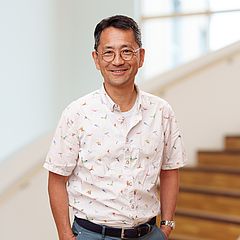Die Universität Witten/Herdecke ist durch das NRW-Wissenschaftsministerium staatlich anerkannt und wird – sowohl als Institution wie auch für ihre einzelnen Studiengänge – regelmäßig akkreditiert durch:



(english version below)
Apl.-Professor Kazuma Matoba leitet eine Forschungsgruppe "Global Social Witnessing and Collective Trauma Integration", die von Thomas Hübl, Acadademy of Inner Science, ideell und finanziell unterstützt wird. Ziel der Forschungsgruppe ist es, kollektive Traumaintegration interdisziplinär zu erforschen und mit Hilfe von Sozialtechniken wie "Global Social Witnessing" persönliche und gesellschaftliche Integrationskompetenz zu entwickeln.
Anlässlich des 75. Jahrestages der Befreiung des deutschen Konzentrations- und Vernichtungslagers Auschwitz am 27. Januar 2020 stellte die Holocaust-Überlebende Batsheva Dagan in ihrer Rede eine interessante Frage: "Wo waren alle? Wo war die Welt, die das sehen und hören konnte, und doch nichts tat, um all diese Tausende zu retten?" (Morris, 2020).Diese Frage von ihr war ein starkes Warnsignal für die Menschheit im 21. Jahrhundert, wo wir ständig mit schrecklichen Krisen konfrontiert sind, wie dem Klimawandel, der Flüchtlingskrise, dem politischen Rechtsruck, den Atomwaffen, der weltweiten Armut, der Covid-19-Pandemie usw. In dieser Zeit der globalen Krise sollten Fragen wie die von Frau Dagan immer wieder gestellt werden: "Wo seid ihr? Wo ist die Welt, die weiß, aber nichts tut?" Sind wir Zeugen der Welt? Wenn wir das Leid der Menschen in den Nachrichten sehen - Kinder, die in Ländern Afrikas hungern, oder eine trauernde Mutter, die ihr lebloses Kind in Syrien in den Armen hält -, empfinden viele Menschen Mitgefühl und Mitleid. Solche Tragödien kommen in unserer heutigen Welt häufig vor, aber der Eindruck, den sie hinterlassen, ist nicht von Dauer, denn die überwältigende Flut solcher Nachrichten hat viele Menschen gegenüber dem Schmerz und dem Leiden in der Welt desensibilisiert. Diese Art von passiver Alltagshaltung ist tief in einem individualistischen Dualismus verwurzelt: Ich (Subjekt) und die Welt (Objekt) sind getrennt. Durch globale Themen wie den Klimawandel und die Flüchtlingskrise haben jedoch viele Menschen begonnen, zu erkennen, dass wir tatsächlich miteinander verbunden sind. So können wir das Leiden anderer Menschen mit der Überzeugung bezeugen, dass wir nicht von ihnen getrennt sind. Stattdessen sind "wir" und "sie" Teil eines größeren Systems. Diese Art der kognitiven und emotionalen Beobachtung kann als Empathie bezeichnet werden, die in den vergangenen Jahren in der Psychologie und den Neurowissenschaften intensiv untersucht wurde (vgl. Bateson, 1991, 2009). Es bleibt jedoch eine kritische Frage offen: Ist Empathie genug? Wir und die Welt sind miteinander verbunden, aber in der "gelebten Welt" (Nishida, 1911) sind wir noch fragmentiert und erleben unsere Verbindung nicht als solche. Ich sehe mich vielleicht als separates, geschlossenes System und kann kein größeres transzendentes System erkennen, in dem "ich" (Subjekt) und die Welt (Objekt) miteinander verbunden sind, denn "die Geschichte wiederholt sich und wir können nichts dagegen tun" (Trilling, 2018). Wenn jemand aus der westlichen Gesellschaft in den Nachrichten ein weinendes Kind in Syrien sieht, kann er Empathie und Mitgefühl mit diesem Kind empfinden. Gleichzeitig kann man sich hilflos und ohnmächtig fühlen, ein Gefühl der Verzweiflung empfinden und ein peripheres Gefühl der Verbundenheit mit der Welt haben. Wie kann man tatsächlich geistig, emotional und körperlich mit allen Menschen und Lebewesen präsent sein, die intensive und tiefe Momente des Kampfes, des Zweifels und des Leidens erleben? Die obige Frage "Sind wir Zeugen der Welt?" ist daher nicht leicht zu beantworten. Diese Forschungsgruppe möchte genauer erforschen, was Zeugenschaft ist, und die Kompetenz zur Zeugenschaft für die kollektive Traumaintegration entwickeln.
Viele soziale und globale Probleme wie die Flüchtlingskrise, Klimagerechtigkeit, Rassismus und Terrorismus haben ihre Wurzeln in schwerwiegenden, unbehandelten historischen Traumata. Diese Traumata wurden von einem oder mehreren Mitgliedern einer Familie, Gruppe oder Gemeinschaft erlebt und können durch epigenetische Faktoren von einer Generation an die nächste weitergegeben worden sein. Phänomene kollektiver Traumata lassen sich durch ihre Interpretation durch die Quantensozialwissenschaft verständlicher beschreiben (vgl. Wendt, 2016; Matoba, 2022). Diese Interpretation liefert eine soziale Pathologie, die methodische Empfehlungen (Behandlungsmethoden) für die Sozialtherapie bietet. Ein mögliches Beispiel ist der von Thomas Hübl (2020) entwickelte kollektive Trauma-Integrationsprozess (CTIP), eine Methode zur Wiederherstellung der Fragmentierung durch die Bearbeitung und Integration von individuellen, überlieferten und kollektiven Traumata. Diese Forschungseinheit konzentriert sich auf eine methodische Überlegung zum Aufbau einer neuen Kultur durch die Integration von kollektiven und intergenerationellen Traumata, die auf der kollektiven Traumaforschung in der Psychologie, Soziologie und Quanten-Sozialwissenschaft basiert.
In diesem Raum können Student:innen neue Ideen, Strategien und Werkzeuge austauschen und mitgestalten, die ihnen helfen, in einer Zeit weltweiter Umbrüche und Transformation reife, globale Bürger:innen zu werden.
- "Mit einem digitalen Toolkit zum globalen Zeugen werden" (Erasmus+, Zuschuss für Erwachsenenbildung in Höhe von 170.000 Euro)
Das DIG-GSW-Projekt befasst sich mit der Bedeutung von "Global Social Witnessing (GSW)" als neues potenzielles Bildungskonzept für transformatives Lernen. Matoba (2019) definiert GSW als eine Methode für die entstehende menschliche Fähigkeit, globale Ereignisse mit einem verkörperten Bewusstsein achtsam zu begleiten und dadurch einen inneren Raum zu schaffen, der diese Ereignisse widerspiegelt. Im 21. Jahrhundert trägt die Erwachsenenbildung eine große Verantwortung für die Schaffung von Räumen, in denen eine kosmopolitische Gesellschaft auf die Zukunft vorbereitet werden kann; in denen Lernende ermutigt werden, die Konturen einer kosmopolitischen Identität und ihre Auswirkungen auf Fragen der sozialen und persönlichen Identität zu erforschen; in denen sie Fähigkeiten erwerben können, globale Perspektiven auf globale politische Prozessen zu entwickeln; und in denen Lernende GSW mit einem offenen Bewusstsein für den hermeneutischen Kreis praktizieren können, in dem sich die Mitglieder einer Organisation von einer Interpretation des breiteren Kontextes einer Perspektive zu einer emphatischen Wahrnehmung der detaillierten Elemente der Botschaft bewegen.
In diesem Rahmen zielt dieses Projekt darauf ab, aktive Bürgerschaft und Ethik im lebenslangen Lernen zu unterstützen sowie die Entwicklung von sozialen und interkulturellen Kompetenzen und kritischem Denken zu fördern. Während des gesamten Projekts werden die Partner neue Ideen, Strategien, Werkzeuge und Energie austauschen und gemeinsam entwickeln, um Menschen dabei zu unterstützen, in einer Zeit weltweiter Umwälzungen und Veränderungen reife Weltbürger:innen zu werden.
- "The Pocket Project" pocketproject.org
Die Vision dieses Projekts ist es, Fragmentierung zu überwinden, indem individuelle und kollektive Traumata angesprochen und integriert werden, um die Wunden der Vergangenheit zu heilen und um beizutragen, die Menschheit auf einen Weg der Zusammenarbeit, Innovation und des Aufbruchs zu bringen. Dieses Projekt sensibilisiert und schult die Zivilgesellschaft und Fachleute über die globalen Auswirkungen und Prozesse zur Integration kollektiver Traumata.
Die Forschungsgruppe "Global Social Witnessing and Collective Trauma Integration" ist ein Kooperationspartner des Pocket-Projekts und unterstützt empirische Forschungen.
- "Soziales Feld und Heilung"
Einer der wirksamsten Ansätze zur kollektiven Traumaintegration ist die Kultivierung von Kohärenz und Widerstandsfähigkeit in Gruppen - "soziales Feld", gefolgt von einem Prozess der bewussten Hinwendung zu individuellem, angestammtem und kollektivem Traumamaterial und dessen Wahrnehmung. Wenn sich Menschen um eine gemeinsame Absicht versammeln, haben sie mehr Ressourcen zur Verfügung und können den Schmerz, der vorher nicht verarbeitet werden konnte, Stück für Stück integrieren.
Dieses Forschungsprojekt soll die Hypothese verifizieren, dass ein kohärenter Wir-Raum und ein Prozess des Bezeugens von kollektivem und intergenerationellem Trauma zur Entstehung eines sozialen Feldes führen kann, in dem eine Integration und schließlich Heilung des kollektiven Traumas möglich ist, indem es die Forschungsfragen beantwortet:
1) Wie kann "Gruppenkohärenz" theoretisch definiert und empirisch gemessen werden?
2) Welche Dimensionen von bio-psycho-socio-spirito-kulturellen Bedingungen sind Voraussetzungen für das Entstehen von Gruppenkohärenz?
Matoba, K. (2000). "Transkultureller Dialog". Marburg: Metropolis.
Matoba, K. (2012). "Transformative Dialogue for Third-Culture Building: Integrierter konstruktivistischer Ansatz für das Management von Diversität". Opladen: Verlag Budrich.werden?
Matoba, K. (2000). „Dialogkompetenz in der transkulturellen Kommunikation“. In. S. Caspary and K. Matoba (Hg.), Transkultureller Dialog. Marburg: Metropolis. S. 55 – 70.
Matoba, K. (2001). „Japan – Eine Gesellschaft ohne Dialog“. In: C. Robertson-Wensauer (Hg.), Japan wohin? Wirtschaft und Politik im 21. Jahrhundert. Baden-Baden: Nomos. S. 209 – 220.
Matoba, K. (2002). „Dialogkompetenz für transkulturelle Kommunikation: Neuer Versuch des Theorieaufbaus für interkulturelles Kommunikationstraining“. In: S. Nakagawa (Hg.), Pädagogische Interaktion und interkulturelles Lernen im Deutschunterricht. Insbruck: Studien Verlag. S. 220 – 234.
Matoba, K. (2002). “Dialogue process as communication training for multicultural organizations”. In: D. Schiereck (Hg.), Socially Responsible Management. Marburg: Metropolis. P. 143 – 166.
Matoba, K. (2007). „Kommunikativer Prozess zur Entwicklung der ‚dritten Kultur‘“. In. I. Koall & V. Bruchhagen (Hg.) Diversity Outlook. Münster: Lit-Verlag. S. 337 – 353.
Matoba, K. (2007). „Interkulturelle Kommunikation und transkultureller Dialog“ (mit D. Scheible). In. M. Kastner, E. Neumann-Held, C. Reick (Hg.): Kulturkonflikte oder Kultursynergien? Lengerich: Pabst Science Publishers. S. 118-130.
Matoba, K. (2007). „Hochschulausbildung für Diversity Management“. (mit C. Herrmann-Pillath u.a.) In. M. Otten, A. Scheitza, A. Cnyrim (Hg.): Interkulturelle Kompetenz im Wandel, Band 2: Ausbildung, Training und Beratung. Frankfurt: IKO-Verlag. S. 343 – 357.
Matoba, K. (2011). Dialogkompetenz für bilaterale Integration. In. D. Treichel & C.H. Mayer (Hg.), „Lehrbuch Kultur“. Münster: Waxmann Verlag. S. 358 – 364.
Matoba, K. (2015). The Diversity Icebreaker for third culture building: a social constructionist approach for managing diversity. In. B. Ekelund & P. Pluta (eds), Diversity Icebreaker II: further perspectives. Oslo: Human Factor Publishing. P. 62 – 103.
Matoba, K. (2003). “Glocal dialogue: Transformation through Transcultural Communication”. Paper for ENGIME Workshop: Communication across cultures in multicultural cities. Social Science Research Network.
Matoba, K. (2014). “Contrasting German and Japanese Integrative Medicine: The Okada Health and Wellness Program and Anthroposophic Medicine”. Research reports from the MOA Health Science Foundation, Vol. 18. P. 3 - 28.
Matoba, K. (2014). “Global integral competence for cosmopolitan communication”. Integral Leadership Review. integralleadershipreview.com/11695-815-global-integral-competence-cosmopolitan-communication/
Matoba, K. (2015). “Cosmopolitan society, identity and education”. МІЖНАРОДНІ ВІДНОСИНИ СЕРІЯ "ПОЛІТИЧНІ НАУКИ". Міжнародні відносини Серія "Політичні науки", No. 5. journals.iir.kiev.ua/index.php/pol_n/issue/view/134
Matoba, K. (2015). Contrasting Anthroposophic Medicine and Okada Purifying Therapy Using Ken Wilber’s Integral Theory: Spiritual Development for Medical Doctors and Therapists. Research report from the MOA Health Science Foundation, Vol. 19. P. 25 – 48.
Matoba, K. (2016). Biofield Therapy as Compound Communication. The Okada Health and Wellness Program and Anthroposophic Medicine. Research report from the MOA Health Science Foundation, Vol. 20. P. 15 – 30.
Matoba, K. (2018). Development of healing competence for Okada Purifying therapy (OPT) through the integral transformation of consciousness and the conscious evolution of humankind. Research report from the MOA Health Science Foundation, Vol. 21. P. 17 – 30.
Matoba, K. (2021). Global Social Witnessing: An Educational Tool for Awareness-Based Systems Change in the Era of Global Humanitarian and Planetary Crisis. Journal of Awareness-Based Systems Change. Vol. 1(1). P. 59-74. doi.org/10.47061/jabsc.v1i1.548
Matoba, K. (2021). The Science of Witnessing: A quantum approach. Zeitschrift für Bewusstseinswissenschaften. 27, Nr. 2. S. 45-59.
Dialogserie "The Science of Witnessing"
Diese Videoreihe lädt Studierende zu Dialogen ein, in denen Sozialaktivisten und Wissenschaftler aus Psychologie, Soziologie und Philosophie über das Wesen und die Anwendung der GSW in ihren Arbeits-/Forschungsbereichen sprechen.


Prof. Dr.
Kazuma Matoba
WittenLab. Zukunftslabor Studium fundamentale
Lehrstuhl für Praktische Philosophie
apl.-Professor
Tel.: +49 2302 / 926-78668
E-Mail: kazuma.matoba@uni-wh.de
E-Mail: Jetzt E-Mail senden
vCard: vCard herunterladen
Apl.-Professor Kazuma Matoba leads a research unit “Global Social Witnessing and Collective Trauma Integration” which is supported intellectually and financially by Thomas Hübl, Academy of Inner Science. The purpose of the research unit is to study collective trauma integration interdisciplinarily and to develop personal and societal integration competence though social technology like “Global Social Witnessing”.
At the 75th anniversary of the liberation of German Nazi concentration and extermination camp Auschwitz on January 27th in 2020, the Holocaust survivor Batsheva Dagan raised an intriguing question in her speech: “Where was everybody? Where was the world, who could see that, hear that, and yet did nothing to save all those thousands?” (Morris, 2020). This question of hers very much acted as a powerful warning signal for humankind in the 21st century, where we are constantly confronted with terrible crises, such as climate change, the refugee crisis, a political trend towards to the right, nuclear weapons, poverty across the globe, the covid-19 pandemic etc. At this time of global crisis, questions such as Ms. Dagan’s should be asked again and again: “Where are you? Where is the world that knows, but does nothing?” Are we witnessing the world? Seeing people’s suffering on the news—children in famine in countries across Africa or a grief-stricken mother holding her lifeless child in Syria—many people feel empathy and compassion. These kinds of tragedy are a frequent occurrence in our world today, but the impression they leave is not permanent, because the overwhelming stream of such news has desensitized many people to the world’s pain and suffering. These kinds of everyday passive attitudes are deeply rooted in an individualistic dualism: I (subject) and the world (object) are separated. Through global issues, such as climate change and the refugee crisis, however, many people have begun to realize that we are in fact connected to each other. Thus, we can testify to the suffering of other people with a belief that we are not separate from them. Instead, ‘we’ and ‘they’ are parts of a greater system. This kind of cognitive and emotional observation can be referred to as empathy, which has been studied intensively in past years in psychology and neuroscience (cf. Bateson, 1991, 2009). However, there still is a critical question remaining: Is empathy enough? We and the world are interrelated, but in the “lived world” (Nishida, 1911) we are still fragmented and do not experience our interconnection as such. I might see myself as a separate closed system and cannot recognize a larger transcendental system in which ‘I’ (subject) and the world (object) are interconnected, as “history is repeating and there’s nothing we can do about it” (Trilling, 2018). When one from Western society sees a crying child in Syria on the news, one might feel empathy and compassion with this child. At the same time, one can feel helpless, powerless, and a sense of despair, and have a peripheral feeling of interconnectedness with the world. How can one actually become present mentally, emotionally, and physically with all human and living beings who experience intense and profound moments of struggle, doubt, and suffering? The question above “Are we witnessing the world?” is therefore not easy to answer. This research unit wants to research more what witnessing is and develop the competence for witnessing for collective trauma integration.
Many social and global issues such as the refugee crisis, climate injustice, racism, whitism, and terrorism are rooted in serious, untreated historical traumata. These traumata have been experienced by one or more members of a family, group, or community, and may have been passed down from one generation to the next through epigenetic factors. Phenomena of collective trauma can be described more understandably through its interpretation by the quantum social science (cf. Wendt, 2016; Matoba, 2022). This interpretation provides a social pathology that offers methodological recommendations (methods of treatment) for social therapy. One potential example is the collective trauma integration process (CTIP) developed by Thomas Hübl (2020), which is a method to restore fragmentation by addressing and integrating individual, ancestral and collective trauma. This research unit focuses on one methodological consideration for building a new culture through the integration of collective and intergenerational trauma which is a framework based on collective trauma research in psychology, sociology and quantum social science.
This research unit provides a space where diverse perspectives/experiences from artists, scientists, spiritual practitioners, and political activists will inspire students to better understand and embody Global Social Witnssing as a practice of collective trauma integration (within their mind, heart, and body). In this space students can exchange and co-create new ideas, strategies, tools, and energy to help them become mature global citizens in a time of world-wide disruption and transformation.
- “Becoming a global witness via digital toolkit” (Erasmus+, Adult Education Grant of 170.000 Euro)
The DIG-GSW project deals with the importance of ‘Global Social Witnessing (GSW)’ as a new potential educational concept for transformative learning. Matoba (2019) defines GSW as a method for the emergent human capacity to mindfully attend to global events with an embodied awareness, thereby creating an inner world space mirroring these events. In the 21st century the adult education has a major responsibility for creating spaces in which a cosmopolitan society can be prepared for the future; where learners are encouraged to explore the contours of cosmopolitan identity, and their implications for questions of social and personal identity; where they can develop skills for ‘global perspective-taking’ in the global political processes; and where learners can practice GSW with an open awareness of the hermeneutic circle in which members of an organization move from an interpretation of the broader context of a perspective to an emphatic cognition of the detailed elements of the message.
In this framework, this project aims to support active citizenship and ethics in lifelong learning as well as to foster the development of social and intercultural competences, and critical thinking. Throughout this project, partners will exchange and co-create new ideas, strategies, tools, and energy to help adults become mature global citizens in a time of world-wide disruption and transformation.
- “The Pocket Project” https://pocketproject.org
The Pocket Project was founded by Thomas Hübl and Yehudit Sasportas to help induce a shift from trauma-inducing to trauma-informed, trauma sensitive and, finally, trauma-integrating institutions and societies. The vision of this project is to restore fragmentation by addressing and integrating individual, ancestral and collective trauma, and to heal the wounds from the past, thus shifting humanity towards a path of collaboration, innovation and emergence. This project raises awareness and train civil society and professionals about the global impact and processes for integration of collective trauma.
Research Unit “Global Social Witnessing and Collective Trauma Integration” is a collaborative partner of the Pocket Project by supporting empirical researches.
- “Social Field and Healing”
One of the most effective approaches to collective trauma integration is the cultivation of coherence and resilience in groups – ‘social field’, followed by a process of consciously turning towards and witnessing individual, ancestral and collective trauma material. As people gather around a shared intention, they have more resources available and can integrate the pain, bit by bit, that could not be processed before.
This research project should verify the hypothesis – coherent we-space and a process of witnessing collective and intergenerational trauma can lead to an emergence of a social filed in which an integration and eventual healing of collective trauma is possible – by answering research questions:
1) how can “group coherence” be defined theoretically and be measured empirically?
2) which dimensions of bio-psycho-socio-spirito-cultural conditions are preconditions for emerging of group coherence?
3) how can an integration of collective trauma be defined, described, analyzed and measured?
4) what does “social filed” mean for health promotion?
This international research project is collaborated with Prof. Dr. Tobias Esch (UW/H), Prof. Dr. Sam Safavi (Arizona), Dr. Payam Dibaj (Göttingen) and Dr. Thomas Hübl (Israel).
Dr. Thomas Hübl (AIS, Israel)
Prof. Dr. Tobias Esch (UW/H, Germany)
Dr. Claus Otto Scharmer (Presencing Institute, USA)
Matoba, K. (2000). „Transkultureller Dialog“. Marburg: Metropolis.
Matoba, K. (2012). “Transformative Dialogue for Third-Culture Building: Integrated Constructivist Approach for Managing Diversity”. Opladen: Verlag Budrich.
Matoba, K. (2000). „Dialogkompetenz in der transkulturellen Kommunikation“. In. S. Caspary and K. Matoba (Hg.), Transkultureller Dialog. Marburg: Metropolis. S. 55 – 70.
Matoba, K. (2001). „Japan – Eine Gesellschaft ohne Dialog“. In: C. Robertson-Wensauer (Hg.), Japan wohin? Wirtschaft und Politik im 21. Jahrhundert. Baden-Baden: Nomos. S. 209 – 220.
Matoba, K. (2002). „Dialogkompetenz für transkulturelle Kommunikation: Neuer Versuch des Theorieaufbaus für interkulturelles Kommunikationstraining“. In: S. Nakagawa (Hg.), Pädagogische Interaktion und interkulturelles Lernen im Deutschunterricht. Insbruck: Studien Verlag. S. 220 – 234.
Matoba, K. (2002). “Dialogue process as communication training for multicultural organizations”. In: D. Schiereck (Hg.), Socially Responsible Management. Marburg: Metropolis. P. 143 – 166.
Matoba, K. (2007). „Kommunikativer Prozess zur Entwicklung der ‚dritten Kultur‘“. In. I. Koall & V. Bruchhagen (Hg.) Diversity Outlook. Münster: Lit-Verlag. S. 337 – 353.
Matoba, K. (2007). „Interkulturelle Kommunikation und transkultureller Dialog“ (mit D. Scheible). In. M. Kastner, E. Neumann-Held, C. Reick (Hg.): Kulturkonflikte oder Kultursynergien? Lengerich: Pabst Science Publishers. S. 118-130.
Matoba, K. (2007). „Hochschulausbildung für Diversity Management“. (mit C. Herrmann-Pillath u.a.) In. M. Otten, A. Scheitza, A. Cnyrim (Hg.): Interkulturelle Kompetenz im Wandel, Band 2: Ausbildung, Training und Beratung. Frankfurt: IKO-Verlag. S. 343 – 357.
Matoba, K. (2011). Dialogkompetenz für bilaterale Integration. In. D. Treichel & C.H. Mayer (Hg.), „Lehrbuch Kultur“. Münster: Waxmann Verlag. S. 358 – 364.
Matoba, K. (2015). The Diversity Icebreaker for third culture building: a social constructionist approach for managing diversity. In. B. Ekelund & P. Pluta (eds), Diversity Icebreaker II: further perspectives. Oslo: Human Factor Publishing. P. 62 – 103.
Matoba, K. (2003). “Glocal dialogue: Transformation through Transcultural Communication”. Paper for ENGIME Workshop: Communication across cultures in multicultural cities. Social Science Research Network.
Matoba, K. (2014). “Contrasting German and Japanese Integrative Medicine: The Okada Health and Wellness Program and Anthroposophic Medicine”. Research reports from the MOA Health Science Foundation, Vol. 18. P. 3 - 28.
Matoba, K. (2014). “Global integral competence for cosmopolitan communication”. Integral Leadership Review. integralleadershipreview.com/11695-815-global-integral-competence-cosmopolitan-communication/
Matoba, K. (2015). “Cosmopolitan society, identity and education”. МІЖНАРОДНІ ВІДНОСИНИ СЕРІЯ "ПОЛІТИЧНІ НАУКИ". Міжнародні відносини Серія "Політичні науки", No. 5. journals.iir.kiev.ua/index.php/pol_n/issue/view/134
Matoba, K. (2015). Contrasting Anthroposophic Medicine and Okada Purifying Therapy Using Ken Wilber’s Integral Theory: Spiritual Development for Medical Doctors and Therapists. Research report from the MOA Health Science Foundation, Vol. 19. P. 25 – 48.
Matoba, K. (2016). Biofield Therapy as Compound Communication. The Okada Health and Wellness Program and Anthroposophic Medicine. Research report from the MOA Health Science Foundation, Vol. 20. P. 15 – 30.
Matoba, K. (2018). Development of healing competence for Okada Purifying therapy (OPT) through the integral transformation of consciousness and the conscious evolution of humankind. Research report from the MOA Health Science Foundation, Vol. 21. P. 17 – 30.
Matoba, K. (2021). Global Social Witnessing: An Educational Tool for Awareness-Based Systems Change in the Era of Global Humanitarian and Planetary Crisis. Journal of Awareness-Based Systems Change. Vol. 1(1). P. 59-74. doi.org/10.47061/jabsc.v1i1.548
Matoba, K. (2021). The Science of Witnessing: A quantum approach. Zeitschrift für Bewusstseinswissenschaften. 27, Nr. 2. S. 45-59.
Die Universität Witten/Herdecke ist durch das NRW-Wissenschaftsministerium staatlich anerkannt und wird – sowohl als Institution wie auch für ihre einzelnen Studiengänge – regelmäßig akkreditiert durch:



